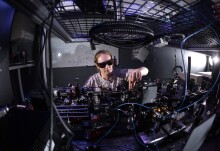

New study reveals genes for melanoma risk<em> - News release</em>
See also...
Press release issued by Kings College London
Strictly embargoed for
18.00 hours British Summer Time
Sunday 5 July 2009
A research team led by the Twin Research Department at King's College London with colleagues from Imperial College London, The Wellcome Trust Sanger Institute, Brisbane Queensland Institute of Medical Research and Leeds has found novel genes for melanoma in one of several studies published in Nature Genetics.
Melanoma incidence has risen rapidly over the last 30 years, so discovering genes that may predict those most at risk of this deadly tumour may prevent increased cases of mortality. It is already known that large numbers of moles (nevi) are the most important risk factor for melanoma - more so than over-exposure to sunshine or use of sunbeds.
People with two copies of both gene variants have double the risk of melanoma
Dr Mario Falchi, the first author of the study, who now works at the Department of Genomic Medicine, Imperial College London, said: "In this study we identified two new genes that confer risk of developing melanoma, most probably by regulating the number of nevi. Approximately one in eleven people of European ancestry carry two copies of both gene variants. These people show twice the number of nevi and double the risk for melanoma."
Research had previously shown that genes influencing the number of moles (nevi) might overlap with those for melanoma. The recent Genome-Wide Association (GWA) study enabled scientists to examine differences in people's DNA code at a third of a million sites and through this also uncovered the two novel genes for melanoma.
For this project, researchers performed a Genome Wide Association study looking at common changes in genes for nevus counts in 1,524 healthy adult female twins from the TwinsUK registry using 300,000 genetic markers known as (SNPs). SNPs in 2 genes, on chromosome 9 (MTAP) and chromosome 22 (PLA2G6), were significantly associated with higher mole (nevus) counts.
Dr Veronique Bataille, Consultant Dermatologist in charge of the skin research programme at the Twin Research Department at King's, and first co-author of the study said: "These new genes may be useful for screening but will also help in understanding melanoma genetic pathways with possible therapeutic targets."
These initial results were replicated in an independent sample of 4,107 adolescent twins from Brisbane. These two genes also predict melanoma risk in several thousand cases of melanoma from around the world (the Genomel Melanoma Consortium).The risk of having double copies of both these gene variants increases melanoma risk by up to two fold. The effect appears to be mediated by the increased number of moles (nevi).
Dr Bataille went on to say: "Moles are common in all European populations and the chance of any of them changing into a melanoma is very small. However, if you do have many moles, especially large moles, it is recommended that you have them checked."
-ENDS-
Notes to editors:
To view the paper, please visit: http://www.nature.com/ng/index.htm
Further information:
Professor Tim D Spector is the senior author - Department of Twin Research and Genetic Epidemiology, King's College London, UK. Tel: +44 (0) 20 7 188 6765, Email: victoria.vazquez@kcl.ac.uk
Dr Mario Falchi PhD is the first author and currently works at the department of Genomic Medicine, Imperial College London. Email: m.falchi@imperial.ac.uk
Dr Veronique Bataille – Joint first author and Principal Dermatologist on study and melanoma expert. Tel: 0207-1886765, Email: bataille@doctors.org.uk
About Imperial College London:
Consistently rated amongst the world's best universities, Imperial College London is a science-based institution with a reputation for excellence in teaching and research that attracts 13,000 students and 6,000 staff of the highest international quality.
Innovative research at the College explores the interface between science, medicine, engineering and business, delivering practical solutions that improve quality of life and the environment - underpinned by a dynamic enterprise culture.
Since its foundation in 1907, Imperial's contributions to society have included the discovery of penicillin, the development of holography and the foundations of fibre optics. This commitment to the application of research for the benefit of all continues today, with current focuses including interdisciplinary collaborations to improve health in the UK and globally, tackle climate change and develop clean and sustainable sources of energy.
Website: www.imperial.ac.uk
About King's College London
King's College London is one of the top 25 universities in the world (Times Higher Education 2008) and the fourth oldest in England. A research-led university based in the heart of London, King's has more than 21,000 students from nearly 140 countries, and more than 5,700 employees. King's is in the second phase of a £1 billion redevelopment programme which is transforming its estate.
King's has an outstanding reputation for providing world-class teaching and cutting-edge research. In the 2008 Research Assessment Exercise for British universities, 23 departments were ranked in the top quartile of British universities; over half of our academic staff work in departments that are in the top 10 per cent in the UK in their field and can thus be classed as world leading. The College is in the top seven UK universities for research earnings and has an overall annual income of nearly £450 million.
King's has a particularly distinguished reputation in the humanities, law, the sciences (including a wide range of health areas such as psychiatry, medicine and dentistry) and social sciences including international affairs. It has played a major role in many of the advances that have shaped modern life, such as the discovery of the structure of DNA and research that led to the development of radio, television, mobile phones and radar. It is the largest centre for the education of healthcare professionals in Europe; no university has more Medical Research Council Centres.
King's College London and Guy's and St Thomas', King's College Hospital and South London and Maudsley NHS Foundation Trusts are part of King's Health Partners. King's Health Partners Academic Health Sciences Centre (AHSC) is a pioneering global collaboration between one of the world's leading research-led universities and three of London's most successful NHS Foundation Trusts, including leading teaching hospitals and comprehensive mental health services. For more information, visit: www.kingshealthpartners.org
The research was funded by the Wellcome Trust and the NHS NIHR. Genotyping was performed by the Sanger Institute
Article text (excluding photos or graphics) available under an Attribution-NonCommercial-ShareAlike Creative Commons license.
Photos and graphics subject to third party copyright used with permission or © Imperial College London.





